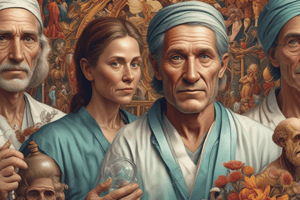Podcast
Questions and Answers
Imhotep, around 2600 BC, documented over 200 medical conditions, marking an early milestone.
Imhotep, around 2600 BC, documented over 200 medical conditions, marking an early milestone.
doctors
Hippocrates is credited as the father of modern medicine. He emphasized natural causes of diseases and introduced the enduring Hippocratic ______.
Hippocrates is credited as the father of modern medicine. He emphasized natural causes of diseases and introduced the enduring Hippocratic ______.
Oath
Roman-era doctors like Galen dissected primates, attempting to understand the human ______.
Roman-era doctors like Galen dissected primates, attempting to understand the human ______.
body
Hippocrates' insights into natural causes of diseases and his enduring oath continue to influence modern ______.
Hippocrates' insights into natural causes of diseases and his enduring oath continue to influence modern ______.
Humanity's oldest form of surgery, dating back 7,000 years is called ______.
Humanity's oldest form of surgery, dating back 7,000 years is called ______.
Persians, Greeks, and Chinese prized mercury for supposed ______ qualities.
Persians, Greeks, and Chinese prized mercury for supposed ______ qualities.
Animal Dung Ointments: Ancient Egyptians used unconventional cures, including lizard blood, dead mice, and ______.
Animal Dung Ointments: Ancient Egyptians used unconventional cures, including lizard blood, dead mice, and ______.
Cannibal Cures: 'Corpse medicine' involved prescriptions containing human flesh, blood, or ______.
Cannibal Cures: 'Corpse medicine' involved prescriptions containing human flesh, blood, or ______.
Chinese Emperor Qin Shi Huang died after ingesting ______ pills.
Chinese Emperor Qin Shi Huang died after ingesting ______ pills.
Romans believed gladiator blood cured ______.
Romans believed gladiator blood cured ______.
Flashcards are hidden until you start studying




